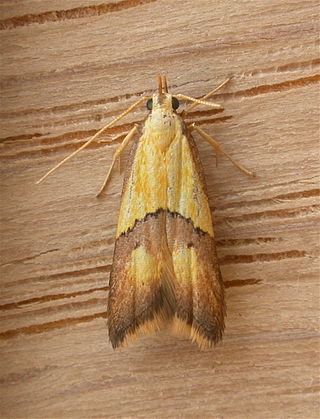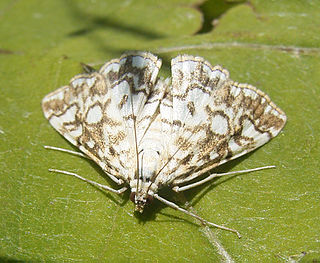Related Research Articles

Edward Meyrick was an English schoolmaster and amateur entomologist. He was an expert on microlepidoptera and some consider him one of the founders of modern microlepidoptera systematics.

Spilomelinae is a very species-rich subfamily of the lepidopteran family Crambidae, the crambid snout moths. With 4,135 described species in 344 genera worldwide, it is the most speciose group among pyraloids.

Urodidae, whose species are commonly known as false burnet moths, is a family of moths in the lepidopteran order. It is the type genus in the superfamily, Urodoidea, with three genera, one of which, Wockia, occurs in Europe.

Heliodinidae, commonly known as sun moths, is a family of small moths with slender bodies and narrow wings. Members of this family are found in most parts of the world. Heliodinid moths are brightly coloured day-flying moths. The base of the haustellum is bare. The scales on the head are compact and appear like a shield. Many Heliodinidae raise their hindlegs when resting but this is not a taxonomic feature and several genera like Epicroesa and Lamprolophus do not show this posture. Many Heliodinidae have the inner and outer spurs of the metatibia subequal. The larval host plants of the majority of species are in the Aizoaceae, Chenopodiaceae, Phytolaccaceae, Portulacaceae and Nyctaginaceae, all in the Order Caryophyllales. A few feed on Onagraceae, Araliaceae and Piperaceae. The pupae have long stiff hairs on their back sides.

The Lecithoceridae, or long-horned moths, are a family of small moths described by Simon Le Marchand in 1947. Although lecithocerids are found throughout the world, the great majority are found in the Indomalayan realm and the southern part of the Palaearctic realm.

Dichomeris is a genus of moths in the family Gelechiidae erected by Jacob Hübner in 1818.

Megacraspedus is a genus of moths in the family Gelechiidae, found primarily in the Palearctic.

Bradina is a genus of moths of the family Crambidae.

Metasia is a genus of moths of the family Crambidae.

Udea is a genus of snout moths in the subfamily Spilomelinae of the family Crambidae. The genus was erected by Achille Guenée in 1845. The currently known 216 species are present on all continents except Antarctica. About 41 species are native to Hawaii.

Scoparia is a grass moth genus of subfamily Scopariinae. Some authors have assigned the synonymous taxon Sineudonia to the snout moth family (Pyralidae), where all grass moths were once also included, but this seems to be in error.

The Autostichinae are a subfamily of moths in the superfamily Gelechioidea. Like their relatives therein, their exact relationships are not yet very well resolved. The present lineage was often included in the concealer moth family (Oecophoridae), but alternatively it is united with the Symmocidae sensu stricto to form an expanded family Autostichidae.

Dichomeridinae is a subfamily of moths in the family Gelechiidae.

Acentropinae is a fairly small subfamily of the lepidopteran family Crambidae, the crambid snout moths. Species of this subfamily are exclusively found in wetlands and aquatic habitats.
Placoptila artionoma is a moth in the family Cosmopterigidae. It is found in New Guinea.
Placoptila cyanolychna is a moth in the family Cosmopterigidae. It is found on Borneo.
Placoptila cyclas is a moth in the family Cosmopterigidae. It is found in India.
Placoptila lucicincta is a moth in the family Cosmopterigidae. It is found on Java.

Anomologinae is a subfamily of moths in the family Gelechiidae.

Gymnobathra is a genus of moths in the family Oecophoridae. It was first described by Edward Meyrick in 1883. All species are found in New Zealand.
References
- ↑ Beccaloni, G.; Scoble, M.; Kitching, I.; Simonsen, T.; Robinson, G.; Pitkin, B.; Hine, A.; Lyal, C., eds. (2003). "Placoptila". The Global Lepidoptera Names Index . Natural History Museum.